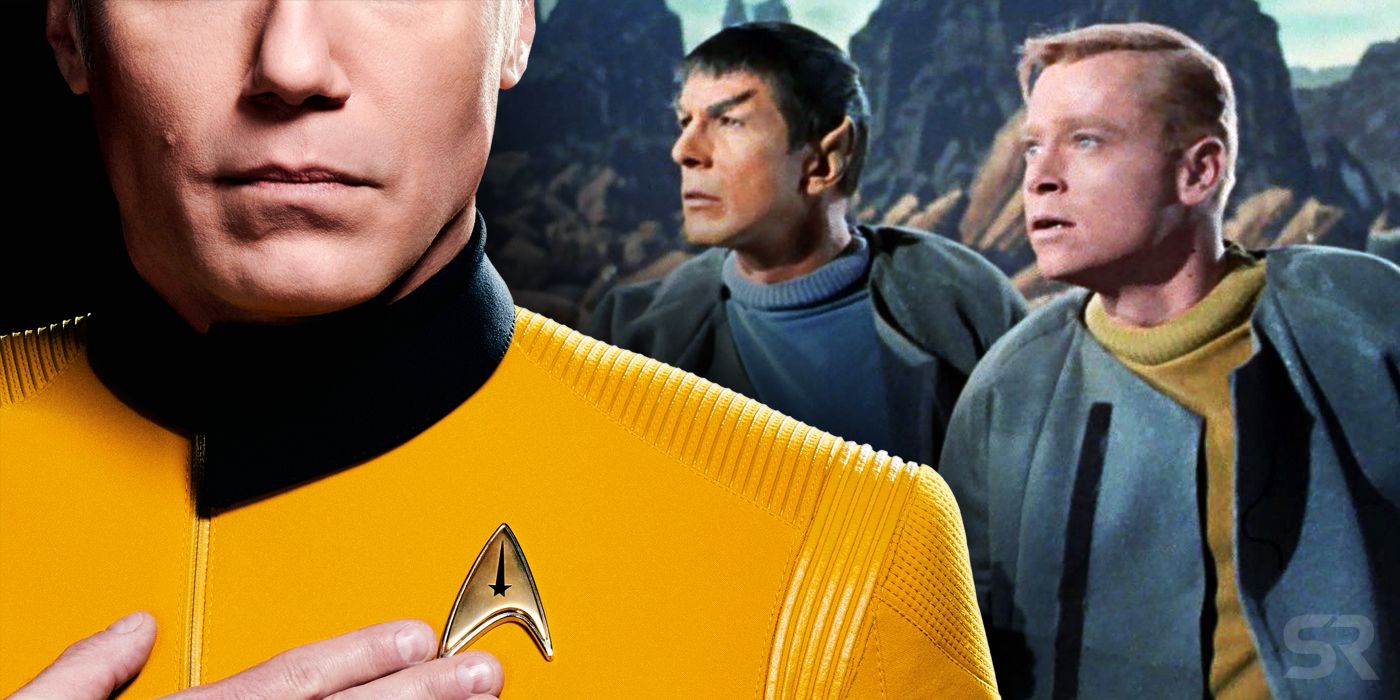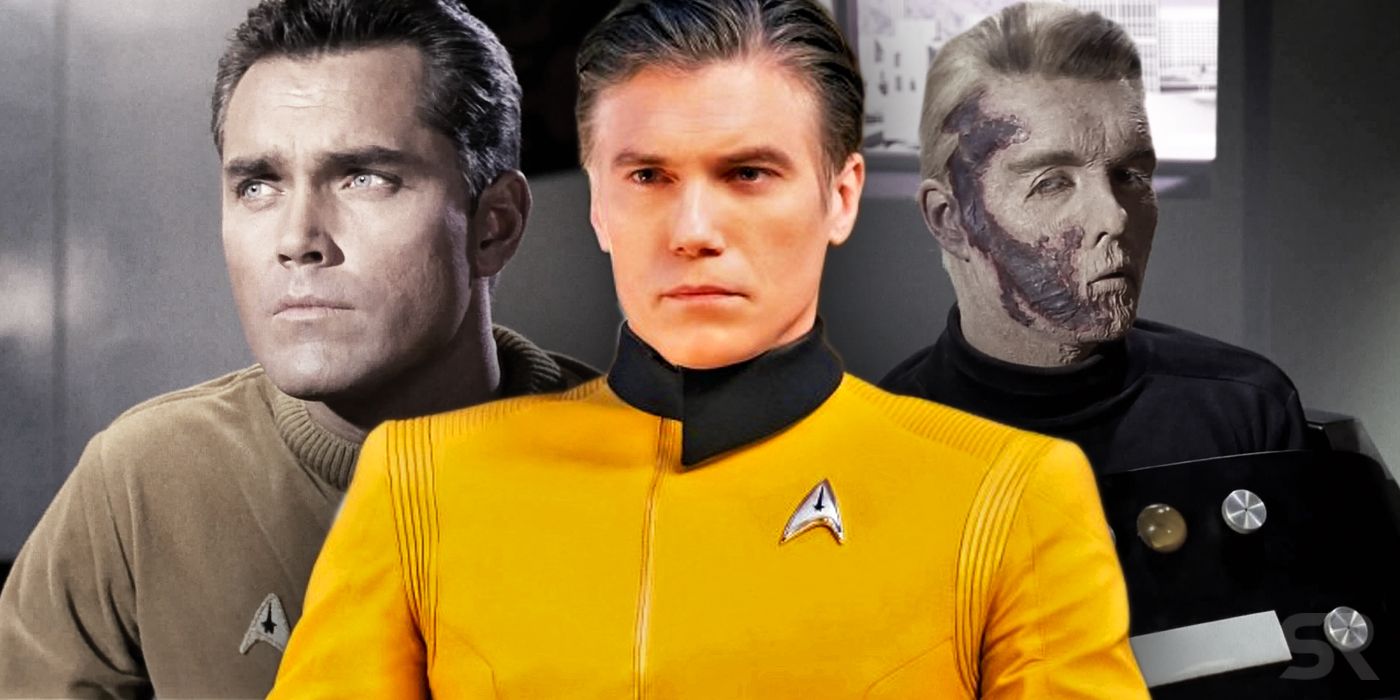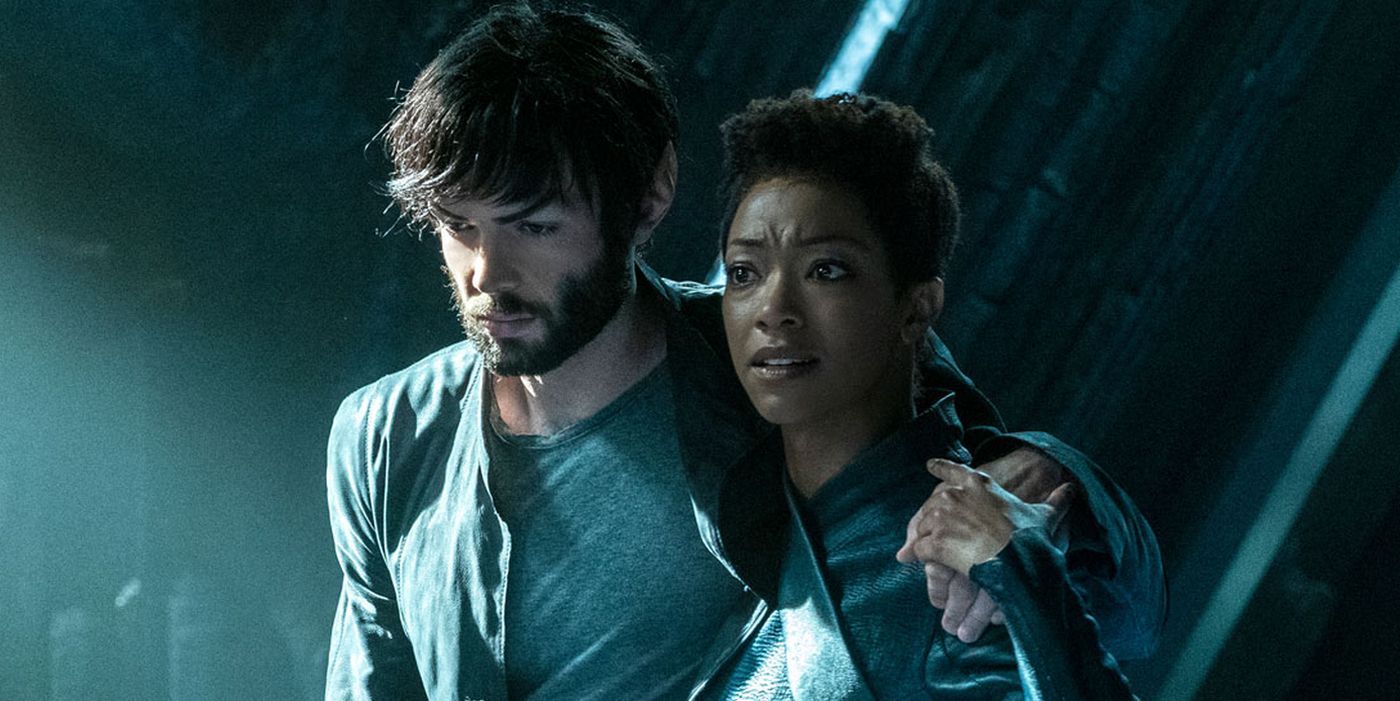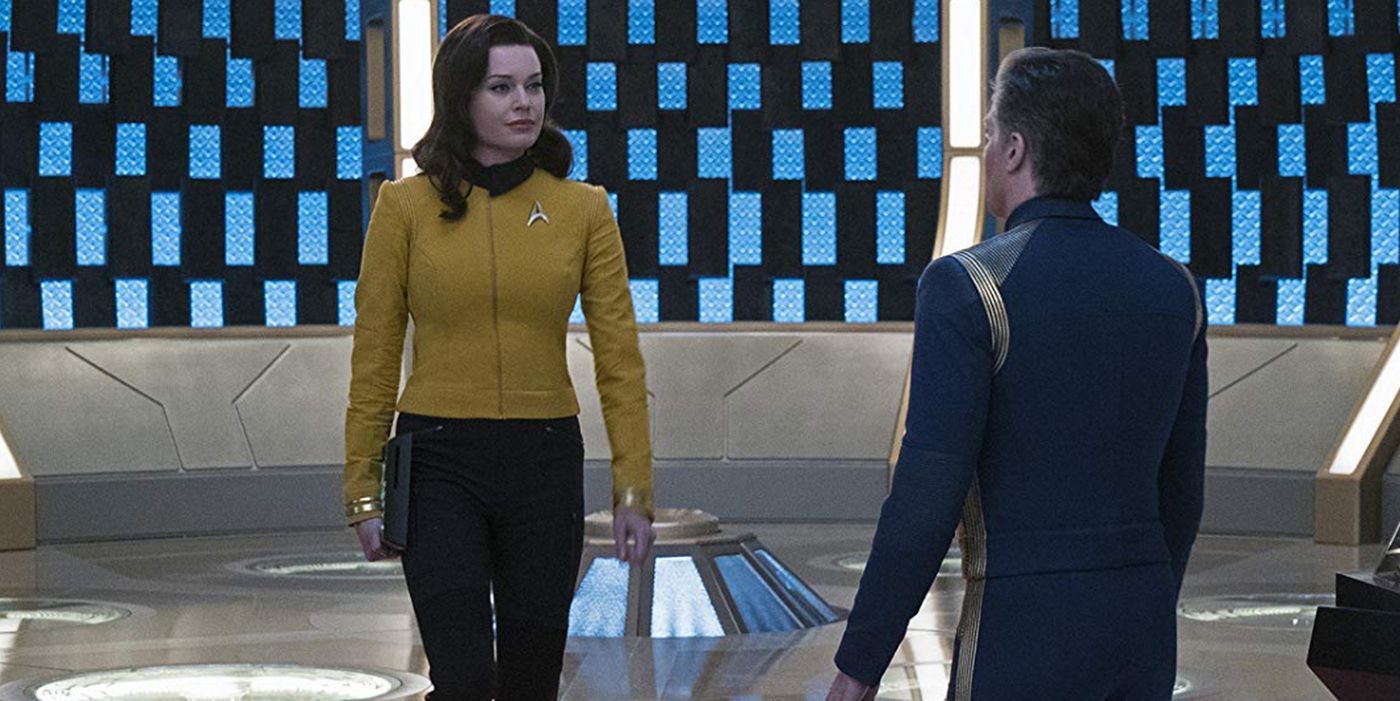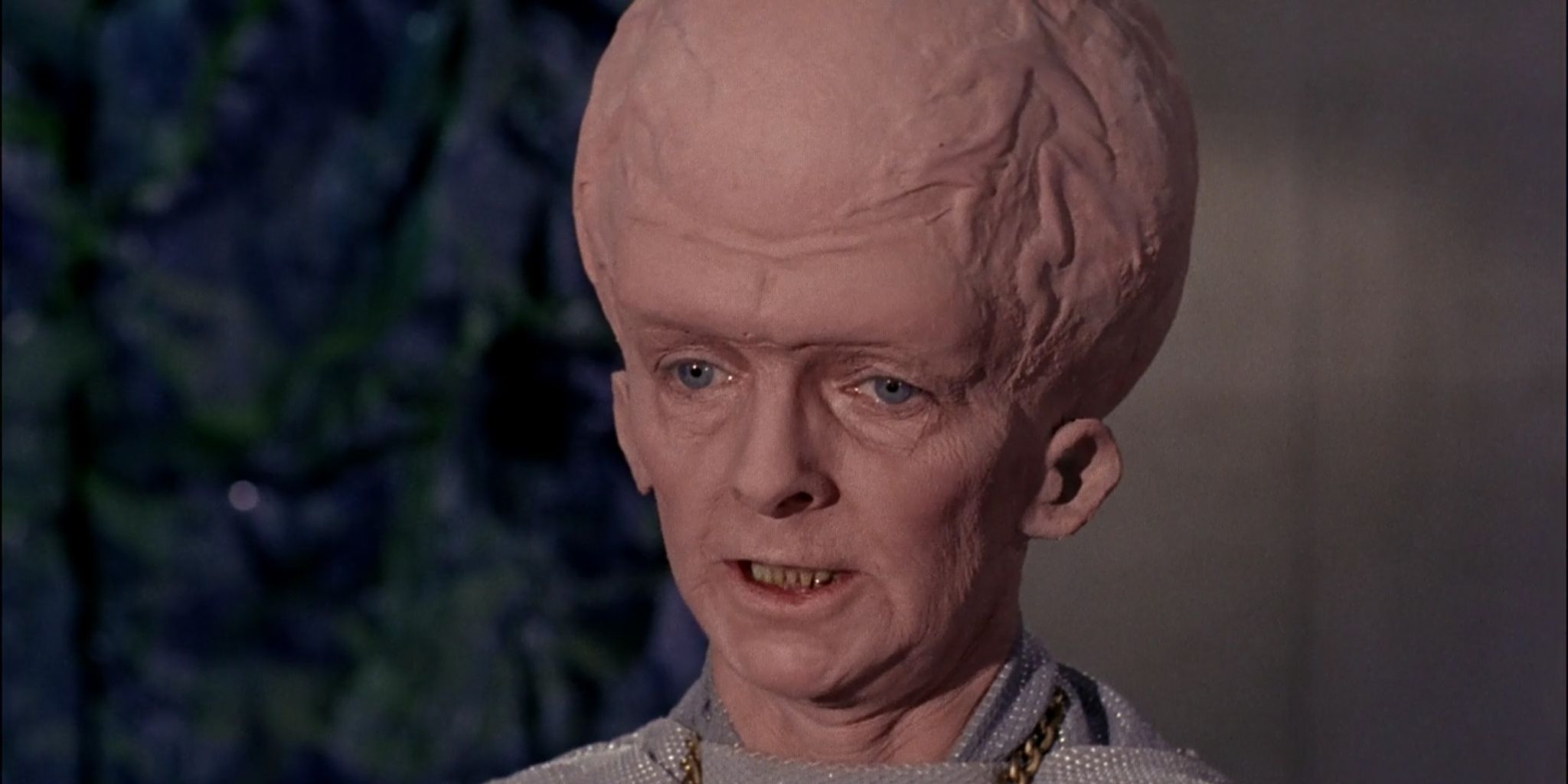Star Trek: Discovery season 2 is bringing greater significance to Star Trek's original unaired pilot than ever before. In episode 8, "If Memory Serves", Spock (Ethan Peck) returns to Talos IV, which will give new context to "The Cage" as the franchise re-introduces its inaugural aliens for the first time since The Original Series. Indeed, much of season 2 thus far has established a more meaningful bond between the CBS All-Access series and the scrapped 1966 pilot.
In Star Trek's lore, "The Cage" was more of a curiosity than anything else and it has been mostly forgotten since season 1 of The Original Series. The first Star Trek pilot produced by creator Gene Roddenberry, which ultimately became a prototype of the series that finally aired starring William Shatner as Captain Kirk and Leonard Nimoy as Mr. Spock, "The Cage" starred Jeffrey Hunter as Captain Christopher Pike, Majel Barrett as Number One, and Nimoy as Spock, but NBC determined the pilot "too cerebral" and told Roddenberry to start over. After he retooled Star Trek (keeping only Spock and the Starship Enterprise), Roddenberry cleverly repurposed "The Cage"'s footage to air as the season 1 two-part episode "The Menagerie", which concluded the story of Pike and Talos IV. Or so fans thought.
Related: Star Trek: Discovery May Be Explaining Spock's Original Series Mutiny
"The Cage" isn't really considered a "must-see" episode of Star Trek and even in "The Menagerie", the story of Spock being court-martialed by Kirk is arguably more compelling than the footage of the original pilot. However, 53 years later, Star Trek: Discovery has not only pulled the events of "The Cage" out of the history books, but the series is also successfully recontextualizing Star Trek's original Captain and the events of the unaired pilot. The results are making "The Cage" more important than they have been since Star Trek's very beginnings. Here's how Star Trek: Discovery season 2 is shedding new light on the characters and concepts that Gene Roddenberry originally envisioned.
- This Page: Star Trek: Discovery Revamps TOS Pilot Characters
- Page 2: Discovery Is Showing How Important The Pilot Already Was
Captain Pike Is Now Living Up To His Star Trek Legend
Star Trek: Discovery has completely revamped Captain Pike for the better. Played by Anson Mount, Pike has taken over command of the U.S.S. Discovery and he has been a highlight of season 2. Pike's sturdy leadership has harkened the series back to the rollicking adventure of classic Star Trek. Yet the new Pike is no throwback; he's a kind, fair, and complex captain who has seamlessly fit in on the Disco. Despite some early tension as he struggled to adjust, Pike has quickly earned the crew's loyalty and respect. Pike also embodies a more traditional version of a Starfleet Captain who is by the book (but who can also improvise on the fly) and he has won over the fans as well.
Fans never really got to know Captain Pike before now. Played by Sean Kenney, Pike was introduced in "The Menagerie" after his tragic delta-ray accident that left him unable to speak and confined to a wheelchair. In fact, the wheelchair and its function to beep once for "yes" and twice for "no" was the main thing Pike was remembered for. In "The Cage", Pike, played by Jeffrey Hunter, was admittedly tired from the pressures of commanding a starship on a five-year deep space mission. He was a bland, straightlaced 1960s action hero and it was understandable why Hunter and Pike were replaced by the more dynamic William Shatner as Kirk as the lead character of Star Trek. Pike wasn't seen again until J.J. Abrams' Star Trek reboot where he was played by Bruce Greenwood and dared Chris Pine's Kirk to join Starfleet. While he was a good mentor, Greenwood's Pike's screen time was still limited; he found himself in a wheelchair at the end of Star Trek and he was killed off early in Star Trek Into Darkness.
Now, thanks to Star Trek: Discovery, fans are finally seeing a Pike who lives up to his legend. True, Anson Mount's Pike has his demons; he feels immense guilt for not being able to fight in the Klingon War. But it's also easy to see why Pike is destined to become a Fleet Captain and one of the most decorated commanders in Starfleet. At last, Captain Christopher Pike is earning his status and he now deserves to be ranked alongside Star Trek's best captains like Kirk, Jean-Luc Picard, and Benjamin Sisko.
Related: Star Trek Theory: Spock Never Mentioned Michael Burnham Because He Forgot Her
Unaired Star Trek Pilot's More Emotional Spock Is Key To Discovery Season 2
Spock was also very different in "The Cage" and it's jarring to see the Vulcan smiling, laughing, and even raising his voice in the unaired pilot. At that very early point in Star Trek, neither Leonard Nimoy nor Gene Roddenberry had quite figured out the Spock character yet. Roddenberry wanted Spock as a prominent alien in the cast to remind the viewers that Star Trek was set in the future, but Spock was also a background character whose importance was increased after the series was retooled.
However, Star Trek: Discovery has cleverly adapted the emotionalism of the early incarnation of Spock and made it a key element of the younger Spock played by Ethan Peck. After becoming psychologically damaged by a vision of the Red Angel, Peck's Spock has lost control of his emotions. This means coming to terms with them once more will become a vital part of how Spock becomes the cool, logical Vulcan who will serve beside Kirk a decade on from Star Trek: Discovery. In addition, Spock has an unresolved conflict with his adopted human sister Michael Burnham (Sonequa Martin-Green) that will also inform why he rededicates himself to embodying Vulcan logic and suppressing his emotional human side.
What Spock's role in the greater story of the Red Angel remains to be seen, but, to ultimately save the galaxy, it seems Spock's human emotions could be just as important as his Vulcan stoicism.
Page 2 of 2: Star Trek: Discovery Is Showing How Important The Pilot Already Was
A Female Number One Is No Longer A Revolutionary Idea
Star Trek originally had a female First Officer - Number One (Majel Barrett) - but the NBC executives felt audiences of that era weren't ready for a woman to be second-in-command of a starship so the character was scrapped. Number One was intended to be cool under pressure, un-emotional, and fiercely loyal to her captain; these traits were transferred to Spock by Gene Roddenberry, who then made the Vulcan Kirk's First Officer.
Related: Star Trek: Discovery's Kelpien Conflict References Multiple TOS Episodes
Star Trek didn't get to break the mold with Number One in the 1960s but, in the decades and many spinoffs since, the idea of a female commander became a simple matter-of-fact throughout Star Trek. There have been many female starship captains and admirals and, of course, Kate Mulgrew's Captain Janeway became the first female captain of her own series, Star Trek: Voyager. Even in Star Trek: Discovery's era, a female First Officer is not a novelty since the first characters fans met were Captain Philippa Georgiou (Michelle Yeoh) and her Number One, Commander Michael Burnham. Meanwhile, all of Star Trek: Discovery's characters answer to Admiral Katrina Cornwell (Jayne Brook) while the Klingons are led by High Chancellor L'Rell (Mary Chieff0). Even the Mirror Georgiou was Emperor of the Terran Empire.
Still, Number One hasn't been forgotten and she has appeared on Star Trek: Discovery played by Rebecca Romijn. Though she's unfortunately still left out of the action, Number One inspired a legion of strong female characters in Star Trek, all of whom owe a debt to the Starship Enterprise's original First Officer, and that includes Star Trek: Enterprise's T'Pol (Jolene Blalock), the Vulcan who now canonically pre-dates Number One as the Enterprise's second-in-command.
The Talosians Set The Stage For Star Trek's Cosmic Menaces
The telepathic, illusion-projecting inhabitants of Talos IV do not rank high on the list of fans' favorite Star Trek aliens like the Klingons, the Borg, the Cardassians, or the Ferengi. However, the Talosians set the stage for the types of extraterrestrial beings that would become a staple of Star Trek. The Original Series especially reveled in powerful cosmic entities like the Metron, the Organians, and Apollo, who exhibited god-like, reality-altering abilities. Star Trek: The Next Generation featured the flamboyantly omnipotent Q (John de Lancie) and Bajor's deities, the Prophets, were a pivotal part of Star Trek: Deep Space Nine. But all of that started with the Talosians, who could cast powerfully real illusions and even project them across space to other planets.
In "If Memory Serves", Star Trek: Discovery will show the Talosians for the first time since "The Menagerie" and will delve into their ties to Spock, who encountered them in "The Cage", which is set three years before Discovery season 2. As a prequel series, providing greater context to Star Trek canon is something Star Trek: Discovery has been excelling at and that should continue with the Talosians; "If Memory Serves" looks to deepen fans' understanding of the telepathic aliens as well as lay the groundwork for Spock working with them to save Pike in "The Menagerie".
By bringing the key characters and concepts of the unaired pilot back to prominence, Star Trek: Discovery not only honors the franchise's very inception but the CBS All-Access series proves itself as a worthy successor to Star Trek's legacy.
Next: Star Trek: Discovery: The Best Theories On The Red Angel's Identity
Star Trek: Discovery streams Thursdays @ 8:30pm on CBS All-Access and internationally the next day on Netflix.

